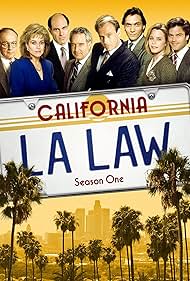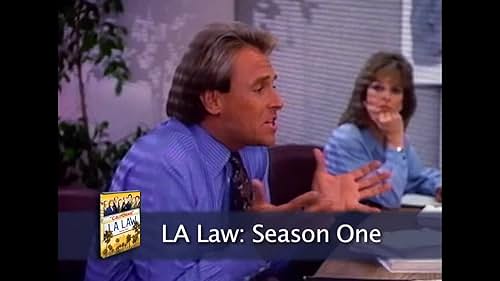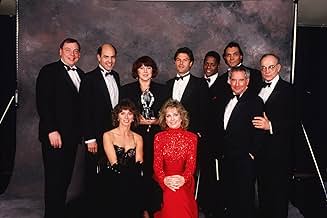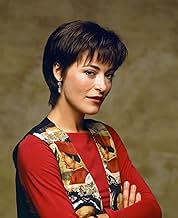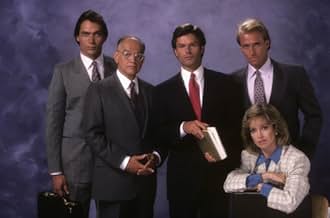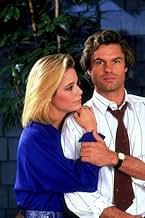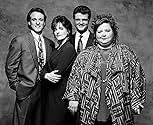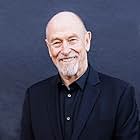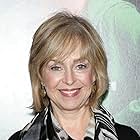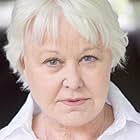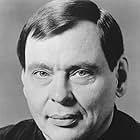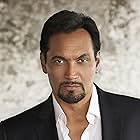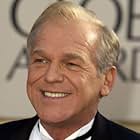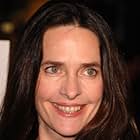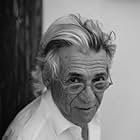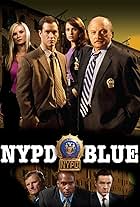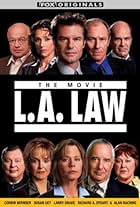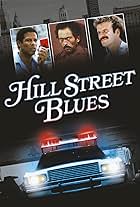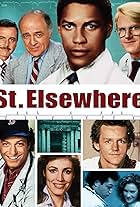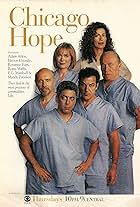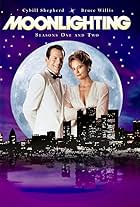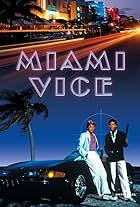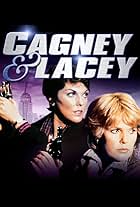The lives and work of the staff of a major Los Angeles law firm.The lives and work of the staff of a major Los Angeles law firm.The lives and work of the staff of a major Los Angeles law firm.
- Won 15 Primetime Emmys
- 45 wins & 148 nominations total
Browse episodes
Storyline
Did you know
- TriviaSeries co-creator Terry Louise Fisher, former Deputy District Attorney for Los Angeles County, former entertainment lawyer for Twentieth Century Fox, and producer and writer for Cagney & Lacey (1981), composed a form letter she was thinking of sending to lawyers who complained about this show: "Dear So-and-so: If I were a good lawyer, I'd still be practicing law. Instead, I'm stuck in Hollywood, making ten times as much money. I hope you are as conscientious about your clients, as you are about our show. Thank you for your writing."
- Quotes
Douglas Brackman, Jr.: I'm more like my father than I thought. I wanted to be the lawyer he was, the man he was. Turns out we both just like to cheat on our wives.
- Crazy creditsThe opening titles begin with a a car trunk being slammed shut revealing the title on a personalized license plate. The license plate expiration sticker always shows the ending year for each season.
- ConnectionsEdited into L.A. Law 100th Episode Celebration (1991)
Featured review
The previous post was less than favorable to this incredible show ("great actors, flawed writing"), so I just had to weigh in. For a moment, forget that "L.A. Law" presented some of the most compelling and unusual legal cases as drama (some of them so unusual, in fact, showrunner David E. Kelley would revisit them in his own "Picket Fences," "The Practice," and even "Ally McBeal").
"L.A. Law" brought black comedy back to television and presented sexuality and sensuality that actually advanced its storylines. The latter were core character traits of Corbin Bernsen's Arnold Becker and Jill Eikenberry's and Michael Tucker's Ann Kelsey and Stuart Markowicz, respectively. You can argue the tastefulness of these scenes and others, but you couldn't make a case for their gratuity.
The writing, of course, enabled the other collaborators on this show to perform at the peaks of their abilities. The show explored some of the more difficult issues of its time through our legal adversarial process. Whether surgeons should be obligated to operate on AIDS patients, the right for the terminally ill to die, the lives of the mentally challenged, sexual dysfunctions, the pressures and responsibilities of the police -- these and other episodes paved the way for the shows we're watching today. "L.A. Law" stood on the shoulders of giants, yes, but it became a giant in its own right.
Arguably the show created by Stephen Bochco and Terry Louise Fisher suffered with the departure of David. E. Kelley in its fifth season. The guys who used to run "St. Elsewhere" had a brief stint as showrunners, and viewers began tuning out when the show became less about L.A. lawyers and more about various medical maladies.
That fifth season was especially dramatic, too, as several cast members also were leaving, which freed the writers from some of the constraints of series television -- namely, that characters could not change significantly from week to week.
To dismiss "L.A. Law" as a show about yuppie lawyers is to misjudge a deep, poignant, and important book by its slick, glossy cover. Check it out.
"L.A. Law" brought black comedy back to television and presented sexuality and sensuality that actually advanced its storylines. The latter were core character traits of Corbin Bernsen's Arnold Becker and Jill Eikenberry's and Michael Tucker's Ann Kelsey and Stuart Markowicz, respectively. You can argue the tastefulness of these scenes and others, but you couldn't make a case for their gratuity.
The writing, of course, enabled the other collaborators on this show to perform at the peaks of their abilities. The show explored some of the more difficult issues of its time through our legal adversarial process. Whether surgeons should be obligated to operate on AIDS patients, the right for the terminally ill to die, the lives of the mentally challenged, sexual dysfunctions, the pressures and responsibilities of the police -- these and other episodes paved the way for the shows we're watching today. "L.A. Law" stood on the shoulders of giants, yes, but it became a giant in its own right.
Arguably the show created by Stephen Bochco and Terry Louise Fisher suffered with the departure of David. E. Kelley in its fifth season. The guys who used to run "St. Elsewhere" had a brief stint as showrunners, and viewers began tuning out when the show became less about L.A. lawyers and more about various medical maladies.
That fifth season was especially dramatic, too, as several cast members also were leaving, which freed the writers from some of the constraints of series television -- namely, that characters could not change significantly from week to week.
To dismiss "L.A. Law" as a show about yuppie lawyers is to misjudge a deep, poignant, and important book by its slick, glossy cover. Check it out.
Details
- Release date
- Country of origin
- Language
- Also known as
- L.A. Law - Staranwälte, Tricks, Prozesse
- Filming locations
- Production company
- See more company credits at IMDbPro
- Runtime46 minutes
- Color
- Aspect ratio
- 1.33 : 1
Contribute to this page
Suggest an edit or add missing content

